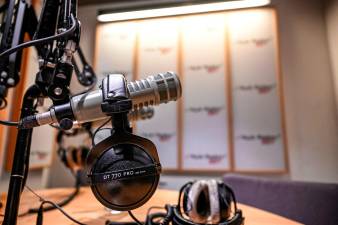NEW YORK: Artificial intelligence now enables mass production of podcasts with completely virtual hosts, disrupting an industry still establishing its footing.
This development threatens podcasting’s fragile business model as automated content creation becomes increasingly accessible.
Google launched Audio Overview, the first mass-market podcast generator creating shows from documents, just over a year ago.
A wave of startups including ElevenLabs and Wondercraft has since entered this emerging market.
These AI tools require no studio, human microphone presence, or traditional recording process.
They can deliver state-of-the-art podcasts complete with banter at the click of a mouse.
Inception Point AI represents a pioneer in this movement, launching in 2023 with just eight team members.
The company releases approximately 3,000 podcasts weekly through automated production methods.
Inception’s founder Jeanine Wright describes their immediate goal as playing the volume game.
Each episode costs merely one dollar to produce, requiring only 20 listens to become profitable.
Automation has dramatically lowered the advertising threshold previously set at several thousand downloads.
Wright cites hyper-niche programming about pollen counts in specific cities as one example.
Such content can attract antihistamine advertisers despite reaching only dozens of listeners.
Many industry observers worry about synthetic content flooding the internet amid generative AI’s rise.
This phenomenon, often called AI slop, particularly concerns social media platforms.
Inception discloses AI’s role in every episode according to company policy.
Wright reports very little listener drop-off despite this transparency about synthetic content.
She believes listeners accept AI-generated content if they appreciate the host and material.
University of Sussex podcast professor Martin Spinelli decries the coming content flood.
He warns this will make independent podcast discovery increasingly difficult without major platform budgets.
The expected programming surge will also cut into non-AI podcasts’ advertising revenue.
Memory Palace creator Nate DiMeo warns about small per-episode profits accumulating through volume.
His pioneering history podcast began in 2008 during podcasting’s earlierå‘展阶段.
DiMeo remains skeptical about mass adoption of AI-generated podcast content.
He believes even modest AI podcast adoption could impact the struggling independent podcast art form.
Major platforms currently don’t require AI disclosure for podcast creators.
Apple Podcasts, Spotify and YouTube maintain no specific policies about synthetic content identification.
Spinelli would pay for AI tools helping listeners cut through content noise.
He finds streaming giants ineffective at connecting niche content with target audiences.
Wright argues against dividing lines between AI and non-AI content.
She predicts everything will incorporate AI to some degree in future production.
Wright believes AI podcasts with synthetic voices will emerge as a distinct genre.
She compares this potential development to live-action films and animation coexistence.
People dismissing all AI content as slop are being thoughtless according to Wright.
She insists compelling AI content deserves audience interest and critical consideration.
DiMeo fundamentally disagrees with this perspective on synthetic content.
He compares podcast listening to reading novels or enjoying music.
DiMeo believes human connection remains essential to meaningful audio experiences.
He finds less reason to listen without that other human consciousness connection. – AFP
